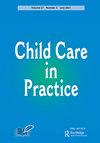How has Covid-19 Impacted on Playwork – One Year on from Returning from Lockdown
IF 1.4
Q3 FAMILY STUDIES
引用次数: 0
Abstract
ABSTRACT When playwork settings re-opened in July 2020 after the first lockdown in March 2020, playwork as a profession demonstrated its adaptable and flexible nature for children to access the provision. This included open access provision becoming closed access and bookable, a reduction in the number of children, resources, and space to play, and increased cleaning. As part of a longitudinal study, now one year how are open access settings (adventure playgrounds and mobile play provision) and closed access settings (breakfast clubs, after-school clubs, and holiday playschemes) operating? An online survey was completed by 42 participants, 31 who ran closed access and 11 who ran open-access settings. Results indicated that all settings were running the same number of days and hours pre-March lockdown, however, fewer children are attending with a smaller number of staff, this being more noticeable within closed access settings. It appears the open access adventure playgrounds are operating as they were pre-March 2020 lockdown, however, the closed access childcare provision, e.g. after-school clubs are still running as they were in July 2020. Although funding has been made available to support aspects such as extra cleaning, playwork settings are concerned with being able to open and continue to operate.Covid-19 对游戏工作的影响--从禁闭室返回一年后的情况
ABSTRACT 当游戏工作场所在 2020 年 3 月的第一次封锁后于 2020 年 7 月重新开放时,游戏工作作为一种职业展示了它的适应性和灵活性,使儿童能够进入游戏工作场所。这包括开放式服务变为封闭式服务和可预约服务,儿童人数、资源和游戏空间减少,清洁工作增加。作为纵向研究的一部分,一年以来,开放式场所(探险游乐场和流动游戏场所)和封闭式场所(早餐俱乐部、课后俱乐部和假日游戏计划)的运营情况如何?42 名参与者完成了一项在线调查,其中 31 人经营封闭式场所,11 人经营开放式场所。调查结果显示,所有机构在三月封锁前的运营天数和小时数都是相同的,但是,参加的儿童人数减少了,员工人数也减少了,这在封闭式机构中更为明显。开放式探险游乐场似乎与 2020 年 3 月封锁前一样运营,但封闭式托儿所(如课后俱乐部)仍与 2020 年 7 月一样运营。尽管已提供资金支持额外清洁等方面的工作,但游乐场仍担心能否开放并继续运营。
本文章由计算机程序翻译,如有差异,请以英文原文为准。
求助全文
约1分钟内获得全文
求助全文
来源期刊

Child Care in Practice
Nursing-Community and Home Care
CiteScore
3.30
自引率
5.30%
发文量
32
期刊介绍:
Child Care in Practice is a quarterly, peer-reviewed journal that provides an international forum for professionals working in all disciplines in the provision of children’s services, including social work, social care, health care, medicine, psychology, education, the police and probationary services, and solicitors and barristers working in the family law and youth justice sectors. The strategic aims and objectives of the journal are: • To develop the knowledge base of practitioners, managers and other professionals responsible for the delivery of professional child care services. The journal seeks to contribute to the achievement of quality services and the promotion of the highest standards. • To achieve an equity of input from all disciplines working with children. The multi-disciplinary nature of the journal reflects that the key to many successful outcomes in the child care field lies in the close co-operation between different disciplines. • To raise awareness of often-neglected issues such as marginalization of ethnic minorities and problems consequent upon poverty and disability. • To keep abreast of and continue to influence local and international child care practice in response to emerging policy. • To include the views of those who are in receipt of multi-disciplinary child care services. • To welcome submissions on promising practice developments and the findings from new research to highlight the breadth of the work of the journal’s work.
 求助内容:
求助内容: 应助结果提醒方式:
应助结果提醒方式:


